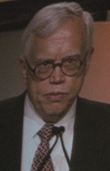The Case for Investing in Disadvantaged Young Children
"What is an economist doing here?" James J. Heckman, winner of the John Bates Clark Medal and the Nobel Prize in Economics, asked to the AAP's opening plenary audience in his keynote address. The answer, it turned out, was to reinforce a core belief with hard data.

"What is an economist doing here?" James J. Heckman, winner of the John Bates Clark Medal andthe Nobel Prize in Economics, asked to the AAP's opening plenary audience in his keynote address. Theanswer, it turned out, was to reinforce a core belief with hard data.
Heckman made some blunt points--at one point he said it would be better to give kids money "ina passbook savings account" than to reduce classroom size using the same funds. But his focus was onwhat makes kids succeed as adults--and what does not.
Heckman's research into GEDs showed that, contrary to popular belief, a GED was as harmful asno degree at all when it came to post-school prosperity. "They're earning at the rate of dropouts,"Heckman said. Taking that research further showed him that helping adults means, to adapt a phrase,treating them as little children.
While cognitive abilities are routinely studied as a measure of excellence in children,physical and metal heath often are not. Heckman's work shows that the positive attitude, motivation,and self-confidence of good mental health are just as important as cognitive skills in success inlife. Indeed, socioeconomic "abilities" can even boost test results.
These abilities are cyclical: a child who fails to receive them early in life will often bedoomed to fail later as well. Early intervention is crucial to break this cycle. (And economical, toboot: one dollar spent early on will save eight dollars in unneeded later assistance.) Due to this low cost of early intervention, and societal benefit, a major refocus of energiesexpended on child health and excellence is required. If for no other reason, it will give a 15% to18% rate of return, better than most any stock or mutual fund.
Heckman brought up the Head Start program of the 1960s, which collected long-term outcomesdata about children's lives as adults. Head Start children did ten points better in IQ scores for thefourth and fifth years of life than the control group, but by the time children were ten both groups'scores were identical. Head Start was considered a failure, he said, because it did not raise IQscores.
But looking at quality of life issues showed a sharp increase in every category -- highachievement in school, on-time graduation, less special education, better earnings, less often onwelfare, and more likely to own a home. The fact that they were less inclined to be arrested forcrime alone, Heckman said, should make early intervention worth society's time.
Both groups had the same intelligence, but one had the skills, the motivation, and theconfidence to be more successful. The earlier those abilities are instilled into children the better."The later we wait," Heckman said, using the dismal science's rhetoric to describe a tragedy, "thelower the economic return."